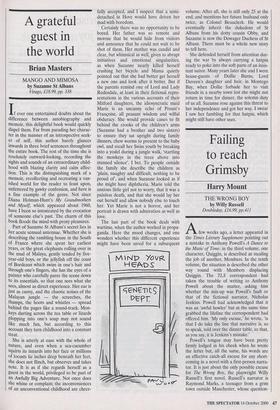A grateful guest in the world
Brian Masters
MANGO AND MIMOSA by Suzanne St Albans Virago, £18.99, pp. 338 If ever one entertained doubts about the difference between autobiography and memoir, this delightful book would quickly dispel them. Far from parading her charac- ter in the manner of an introspective seek- er of self, this author barely glances Inwards in three brief sentences throughout the entire book. The rest of the time she is resolutely outward-looking, recording the sights and sounds of an extraordinary child- hood with blazing clarity and calm affec- tion. This is the distinguishing mark of a memoir, recollecting and recreating a van- ished world for the reader to feast upon, unfettered by gawky confession, and here is a fine example of the genre. Not since Diana Holman-Hunt's My Grandmothers and Myself, which appeared about 1960, have I been so intoxicated by the evocation of someone else's past. The charm of this book floods the mind with proxy pleasures.
Part of Suzanne St Albans's secret lies in her acute sensual antennae. Whether she is describing the rambling house in the South of France where she spent her earliest years, or the great elephants rolling over in the mud of Malaya, gently tended by five- year-old boys, or the jellyfish off the coast of Bordeaux which swim in one's hair and through one's fingers, she has the eyes of a painter who carefully pares the scene down to its essentials, so that one sees what she sees, almost as direct experience. Her ear is Just as canny, and the chaotic noises of the Malayan jungle — the screeches, the thumps, the hoots and whistles — spread behind the pages like a sound-track. Mon- keys darting across the tea table or lizards plopping into one's soup may not sound like much fun, but according to this account they turn childhood into a constant treat.
She is utterly at ease with the whole of nature, and even when a sea-cucumber squirts its innards into her face or millions of locusts lie inches deep beneath her feet, she does not flinch, but observes and takes note. It is as if she regards herself as a guest in the world, privileged to be part of an Awfully Big Adventure. Not once does she whine or complain; the inconveniences of an unconventional childhood are cheer- fully accepted, and I suspect that a semi- detached in Hove would have driven her mad with boredom.
Certainly there was no opportunity to be bored. Her father was so remote and morose that he would hide from visitors and announce that he could not wait to be shot of them. Her mother was candid and clear, but whimsical as well, given to abrupt initiatives and emotional singularities, as when Suzanne nearly killed herself crashing her bicycle and Mama quietly pointed out that she had better get herself a new one and look after it better. But if the parents remind one of Lord and Lady Redesdale, at least in their fictional repre- sentations in the various accounts of their Mitford daughters, the idiosyncratic maid Marie is an uncanny echo of Proust's Francoise, all peasant wisdom and wilful obduracy. She would provide canes to fit behind the crooks of the children's arms (Suzanne had a brother and two sisters) to ensure they sat upright during family 'dinners, chew worms to present to the baby owl, and recall her Swiss youth by breaking into a yodel during a jungle walk, 'startling the monkeys in the trees above into stunned silence'. I bet. To people outside the family she describe the children as `plain, naughty and difficult, nothing to be proud of, and when Suzanne looked as if she might have diphtheria, Marie told the anxious little girl not to worry, that it was a painless death, and that she would lay her out herself and allow nobody else to touch her. Yet Marie is not a horror, and her portrait is drawn with admiration as well as love.
The last part of the book deals with wartime, when the author worked in propa- ganda. Here the mood changes, and one wonders whether this different experience might have been saved for a subsequent volume. After all, she is still only 25 at the end, and mentions her future husband only twice, as Colonel Beauclerk. He would eventually inherit the dukedom of St Albans from his dotty cousin Obby, and Suzanne is now the Dowager Duchess of St Albans. There must be a whole new story to tell here.
She defended herself from attention dur- ing the war by always carrying a hatpin ready to poke into the soft parts of an insis- tent suitor. Many years later she and I were house-guests of Dollie Burns, Lord Duveen's daughter and heir, in Montego Bay, when Dollie forbade her to visit friends in a nearby town lest she might not return in time for dinner, the solemn duty of us all. Suzanne rose against this threat to her independence and got her way. I swear I saw her fumbling for that hatpin, which might still have other uses.


















































































 Previous page
Previous page